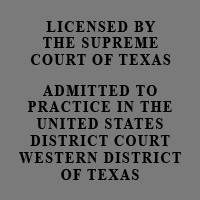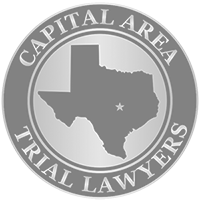Texas Intestate Law Determines How Estate Property Including Community Property, Separate Property, Real Property, and Personal Property Is Distributed When Someone Dies Without a Will By Texas Intestate Lawyer and Texas No Will Inheritance Lawyer Jason S. Coomer
The below provisions of the Texas Probate Code determine how a person's property will pass when they die if the person resided in Texas at the time of their death and did not have a valid Will. For questions on Texas Intestate Law, please feel free to send an e-mail message to Austin Texas Intestate Lawyer and Austin Texas No Will Inheritance Lawyer Jason S. Coomer or use our contact form The Law Offices of Jason S. Coomer.
Intestate Provisions of
the Texas Probate Code
Texas Intestate Law
§ 37. PASSAGE OF TITLE UPON INTESTACY AND UNDER A WILL. When a person dies, leaving a lawful will, all of his estate devised or bequeathed by such will, and all powers of appointment granted in such will, shall vest immediately in the devisees or legatees of such estate and the donees of such powers; and all the estate of such person, not devised or bequeathed, shall vest immediately in his heirs at law; subject, however, to the payment of the debts of the testator or intestate, except such as is exempted by law, and subject to the payment of court-ordered child support payments that are delinquent on the date of the person's death; and whenever a person dies intestate, all of his estate shall vest immediately in his heirs at law, but with the exception aforesaid shall still be liable and subject in their hands to the payment of the debts of the intestate and the delinquent child support payments; but upon the issuance of letters testamentary or of administration upon any such estate, the executor or administrator shall have the right to possession of the estate as it existed at the death of the testator or intestate, with the exception aforesaid; and he shall recover possession of and hold such estate in trust to be disposed of in accordance with the law.
§ 38. PERSONS WHO TAKE UPON INTESTACY. (a) Intestate leaving No Husband or Wife. Where any person, having title to any estate, real, personal or mixed, shall die intestate, leaving no husband or wife, it shall descend and pass in parcenary to his kindred, male and female, in the following course: 1. To his children and their descendants. 2. If there be no children nor their descendants, then to his father and mother, in equal portions. But if only the father or mother survive the intestate, then his estate shall be divided into two equal portions, one of which shall pass to such survivor, and the other half shall pass to the brothers and sisters of the deceased, and to their descendants; but if there be none such, then the whole estate shall be inherited by the surviving father or mother. 3. If there be neither father nor mother, then the whole of such estate shall pass to the brothers and sisters of the intestate, and to their descendants. 4. If there be none of the kindred aforesaid, then the inheritance shall be divided into two moieties, one of which shall go to the paternal and the other to the maternal kindred, in the following course: To the grandfather and grandmother in equal portions, but if only one of these be living, then the estate shall be divided into two equal parts, one of which shall go to such survivor, and the other shall go to the descendant or descendants of such deceased grandfather or grandmother. If there be no such descendants, then the whole estate shall be inherited by the surviving grandfather or grandmother. If there be no surviving grandfather or grandmother, then the whole of such estate shall go to their descendants, and so on without end, passing in like manner to the nearest lineal ancestors and their descendants. (b) Intestate Leaving Husband or Wife. Where any person having title to any estate, real, personal or mixed, other than a community estate, shall die intestate as to such estate, and shall leave a surviving husband or wife, such estate of such intestate shall descend and pass as follows: 1. If the deceased have a child or children, or their descendants, the surviving husband or wife shall take one-third of the personal estate, and the balance of such personal estate shall go to the child or children of the deceased and their descendants. The surviving husband or wife shall also be entitled to an estate for life, in one-third of the land of the intestate, with remainder to the child or children of the intestate and their descendants. 2. If the deceased have no child or children, or their descendants, then the surviving husband or wife shall be entitled to all the personal estate, and to one-half of the lands of the intestate, without remainder to any person, and the other half shall pass and be inherited according to the rules of descent and distribution; provided, however, that if the deceased has neither surviving father nor mother nor surviving brothers or sisters, or their descendants, then the surviving husband or wife shall be entitled to the whole of the estate of such intestate.
§ 45. COMMUNITY ESTATE. (a) On the intestate death of one of the spouses to a marriage, the community property estate of the deceased spouse passes to the surviving spouse if: (1) no child or other descendant of the deceased spouse survives the deceased spouse; or (2) all surviving children and descendants of the deceased spouse are also children or descendants of the surviving spouse. (b) On the intestate death of one of the spouses to a marriage, if a child or other descendant of the deceased spouse survives the deceased spouse and the child or descendant is not a child or descendant of the surviving spouse, one-half of the community estate is retained by the surviving spouse and the other one-half passes to the children or descendants of the deceased spouse. The descendants shall inherit only such portion of said property to which they would be entitled under Section 43 of this code. In every case, the community estate passes charged with the debts against it.
As a Texas Intestate Attorney, Jason Coomer helps families through intestate proceedings including drafting probate documents such as an Affidavit of Heirship and Small Estate Affidavit as well as assisting heirs through a Suit to Determine Heirship. He helps rightful heirs gain control of their lost loved one's estate to be able to sell stock, claim pensions, use bank accounts, claim oil interests, sell homes, or clear title to other real estate.
Austin Texas Probate Lawyer, Jason Coomer works with families and friends that have lost someone and need help navigating the Travis County Probate Court, Williamson County Court #4, Bexar County Probate Courts, and the Hays County Court. He also drafts Wills and Trusts to protect the wishes and best interests of his clients. For questions on Texas Intestate Law, please e-mail Austin Probate Attorney Jason S. Coomer at jason@texaslawyers.com or use our contact form The Law Offices of Jason S. Coomer.
The Law Offices of Jason S.
Coomer, PLLC
3901 S. Lamar Blvd., Ste. 260
Austin, Texas 78704
(512) 474-1477
jason@texaslawyers.com
Feel Free to Contact Us with any Questions
Associations




